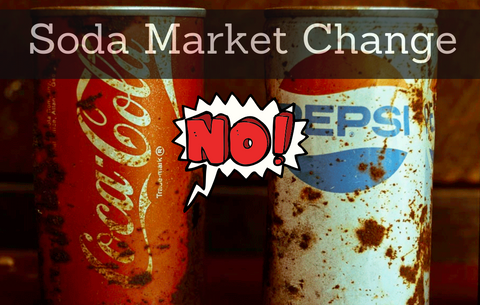Every day, more and more industries are killed by millennials. At least, that’s what increasingly frustrating headlines want us to believe. In reality, the generation that currently sits aged 18-35 is simply making smarter decisions, realizing that their wallets are their loudest voice. One industry that has seen the beginnings of a major changing of the guard is the soda industry as natural, organic soda pops continue to grow in popularity, looking to overtake some of the more popular names in the industry.
A major factor in the decline in sales of traditional sodas such as Coca-Cola or Pepsi is simply the millennial view on health and the environment. For many years, soda companies were able to easily market their sugar-filled drinks to young people and children. Nowadays, it isn’t as easy as simply putting a famous football player in your commercial. Millennials tend to be significantly more conscious about the kinds of things they choose to ingest, recognizing the litany of health issues facing the generation that preceded them.
Because of this, sugary sodas are no longer the fun alternative to water that they used to be. The group of corporations dubbed “Big Soda” (made up of Coca-Cola, PepsiCo, and the Dr. Pepper Snapple Group) are viewed on a similar level as the tobacco industry of the past. Their cheap marketing tactics and complete disregard for transparency allowed them to take advantage of unaware consumers for decades. But now, people are growing smarter.
With each generation, society as a whole begins to question large entities that may have been blindly trusted in the past, like the government, the education system, and, most importantly, corporations. This “Problem of Modernity” is hardly a problem at all. As citizens grow more and more independently educated, their faith in these big conglomerates begins to decay. More questions are asked and ultimately, the global standards of behavior for these entities are raised.
With the soda industry, millennials have made a shift away from mass-produced soda pops towards more natural, more organic soft drinks. Typically, these drinks come from smaller, more artisanal “mom and pop”-style companies rather than large corporations. This has led to a dramatic shift in the soft drink market.
As craft sodas such as Galvanina and flavored waters like Voss continue their climb toward the top of the soft drink market, traditional soda companies are scrambling to find a way to right a sinking ship. Red Bull released a line of “organic” drinks (that weren’t very organic) and Coca-Cola had their failed Coca-Cola Life product line. These companies are trying to cater to a market that craves healthier, smarter options but are failing to miss one of the most important aspects of the craft beverage market: societal impact.
Beyond the healthier, more organic ingredients that are often used to create a majority of craft sodas is the care that goes into the product. These drinks are not simply products. Small, artisan sodas have a story to tell. Many of these products have some kind of focus, whether it be on helping communities or alleviating some of the harm being done to the environment. This focus on being more than just a product to be used and forgotten appeals to millennials, a politically-driven, socially-conscious generation.
In 2018, 62% of consumers expressed a desire for food and beverage companies to take more of an interest in making a difference in the world. The organic soda market approach to sustainability and healthy living inherently caters directly to this desire, something Big Soda has been failing to do for years. As society grows and progresses, soda pop companies are experiencing some major growing pains and, in just a few short years, the market is almost unrecognizable.


